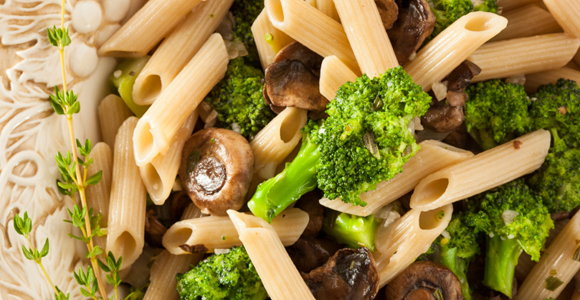If you've heard that you should be eating complex carbohydrates rather than simple carbs, you may wonder what exactly complex carbohydrates are and what their benefits may be.
So, What Are They?
There are three macronutrients--protein, fat and carbohydrate. Carbohydrates can further be categorized as simple or complex. Simple carbohydrates are the monosaccharides, or single sugar molecules--glucose, fructose and galactose. Simple carbohydrates also include dissaccarides, which are made up of two sugar molecules. For example, table sugar is a dissacharide--it is glucose linked with fructose.
And Complex Carbohydrates?
Complex carbohydrates are polysaccharides. Polysaccharide means "many sugars." Polysaccharides, or complex carbohydrates, are several simple sugar molecules linked together. They can be as many as 10,000 simple sugar molecules linked together. Starch and fiber are complex carbohydrates because they are polysaccharides.
Which is Better? Simple or Complex?
For most people, it's better to choose more complex carbohydrate foods over simple carbohydrate foods. This is for two reasons.
The first reason is that complex carbohydrates usually take longer to be broken down into glucose in your blood, meaning they provide prolonged energy and stabilize your blood sugar rather than spiking it up like simple carbohydrates do. A blood sugar spike, such as one resulting from eating food high in simple carbohydrates like candy, can be bad for your health if it happens too often, which is part of the reason you shouldn't eat too much junk food.
The second reason complex carbohydrates are better than simple carbohydrates for most people is that they provide more nutrition than simple carbohydrates. Most complex carbohydrate-containing foods are higher in fiber, vitamins, minerals and other nutrients.
How Can You Tell if a Starch Is Complex or Not?
Even though starch is a complex carbohydrate, the complexity of starchy foods can vary, meaning there are better starchy food choices than others. For example, whole grains are more complex than refined grains and are a better choice of grains for most people.
Refined grains have had parts of the grain removed which explains why they are digested faster than whole grains--your body has less breaking down to do. Whole grains such as brown rice, oatmeal and 100 percent whole-wheat breads, cereals and pastas are not refined like white rice, breads cereals and pastas are.
Whole grains are considered whole because they still contain the germ, endosperm and bran. The bran is the outer layer of the grain where most of the fiber, B vitamins and minerals are contained while the germ is the next layer containing many other nutrients including vitamin E and essential fatty acids. The endosperm is the starchy middle of the grain. Because whole grains contain all three parts of the grain, they contain more nutrients than refined grains do. More complex carbohydrates food choices do not only include unrefined whole grains. Vegetables, beans, legumes, nuts, seeds and fruit also contain complex carbohydrate and are healthy food choices for most people.
Jamie Yacoub, M.P.H., R.D. is a clinical dietitian with a Master's of Public Health in Nutrition She obtained her Bachelor of Science in clinical nutrition from UC Davis after four years, during which time she participated in internships in several different nutrition environments including Kaiser Permanente and Women, Infants, & Children (W.I.C.). After graduating from UC Davis, she went on to study public health nutrition at Loma Linda University where she obtained her Master's of Public Health in Nutrition. Jamie completed the community nutrition portion of her dietetic internship as an intern for a Certified Specialist in Sports Nutrition. She completed both the food service and clinical portions of her dietetic internship at a top 100 hospital in the nation, where she was hired as the only clinical dietitian shortly after. Jamie now works as an outpatient clinical dietitian and is an expert in Medical Nutrition Therapy (M.N.T.) using the Nutrition Care Process (N.C.P.) including past medical history and current laboratory values as a basis of nutrition assessment.



